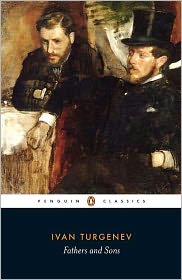Rating: 4 Stars
[Translated from the Russian by Rosemary Edmonds]
Ivan Sergeyevich Turgenev (1818-1883) was among the first of 19th. Century Russian writers to win both acclaim in Europe and popularity at home. Fathers and Sons, considered his most successful work by many, was published in 1861, and deals on the social end with the political reforms introduced to Russia at the time. Closer to the heart, it’s about the age-old struggle between the generations to understand another. George Bernard Shaw would seem to have said it right that, “it is all that the young can do to for the old, to shock them and keep them up to date”.
The stormy petrel of the novel, Bazarov, seems to apply that rule anyway. Not that Bazarov looks to jolt anyone; he is merely a practicing ‘nihilist’, a term so outdated today as to appear quaint. As he tells another character,
“In these days the most useful thing we can do is to repudiate – and so we repudiate.”
“Everything?”
“Everything.”
Among the things Bazarov repudiates wholesale are all governmental institutions, philosophy, art, nature, faith, love, marriage, and tender sentiments. In our day, he might well appear to be a candidate for Prozac, but Bazarov is so over-poweringly robust, confident and derisive, that the milder souls around him are set all atwitter with admiration, intrigue or irritation.
Bazarov’s young friend, Arkady looks up to Bazarov as his mentor, and makes patent efforts to adopt an attitude and philosophy that is alien to his own nature. In truth, Arkady is more like his shy, liberal, and music and nature loving father, Nikolai Kirsanov than he wants to admit. Kirsanov is hurt by the growing distance between him and his son, and perceives that Bazarov’s influence over Arkady is responsible for it, but he is too good-natured to hold a grudge against him for that. Arkady’s uncle, Pavel Petrovich, a man who is aristocratic by birth and temperament, bristles at Bazarov’s flippant manner to him, and is less forgiving than Nikolai. Anna Odintsov, a beguiling young widow is attracted to Bazarov, but will brook no threat to her independence and comfortable lifestyle.
Bazarov, who by all rights should be insufferable, is nevertheless a winning character. He has intelligence, integrity, and a sense of humor, and is by no means as invulnerable as he makes himself out to be. Like Arkady, he too is a much-loved son, and there is a pathos and tenderness in the way his elderly parents dance around his every wish, in terror of wearing out his patience with their affection. Neither is Bazarov , though certainly far from being sensitive, completely indifferent to them.
The picture we get of Russia in the second half of the 1800s is of a country in the throes of a dubious reform. The Liberals, Radicals and old land-owners are in deep contention with one another. The serfs, despite their abject poverty, ignorance and disorganization, are already seen as a danger if not an imminent menace. Well, we know how that story played out. ‘Fathers and Sons’ though considered a highly political novel at the time of its publication is now less about political trends and ideologies that wax and wane with the times. Its meaning to us, living in a different age, lies in those values on which Bazarov dispenses his scorn, that yet outlast every generation and live on undyingly into the next.


No comments:
Post a Comment